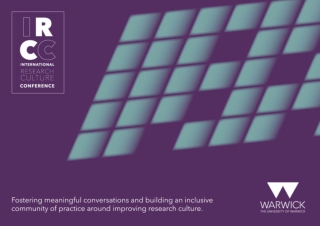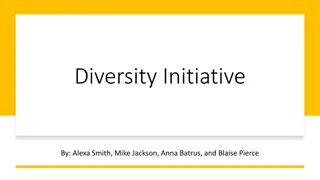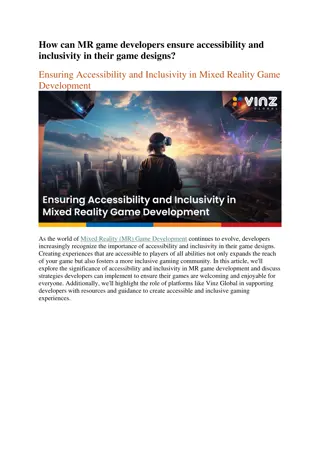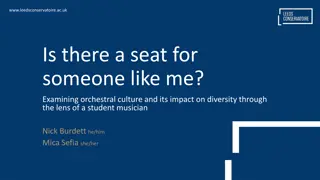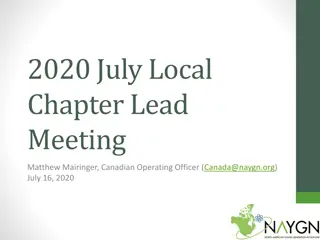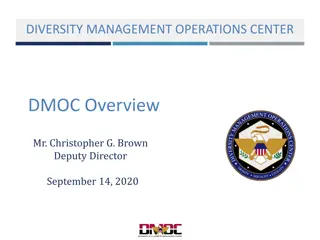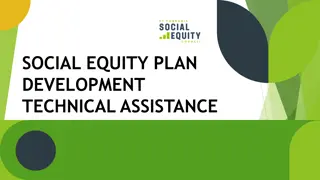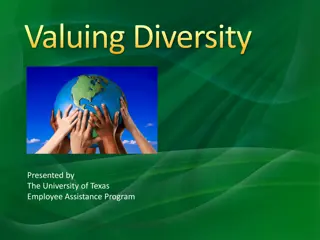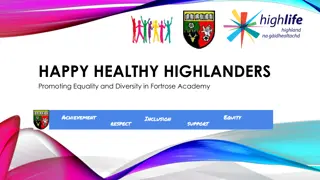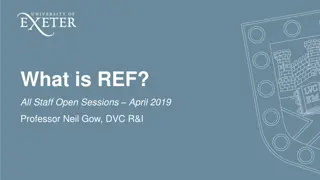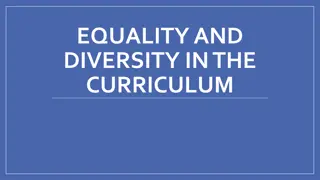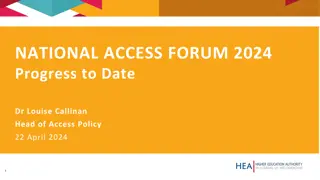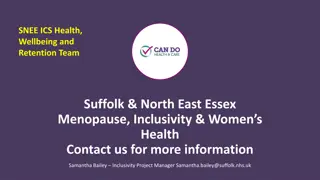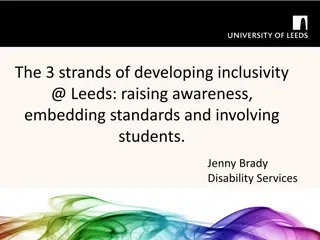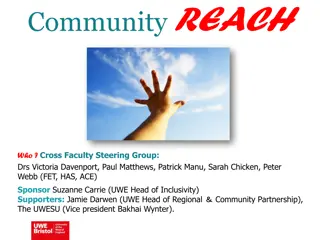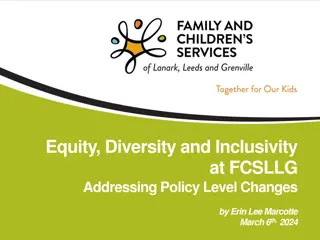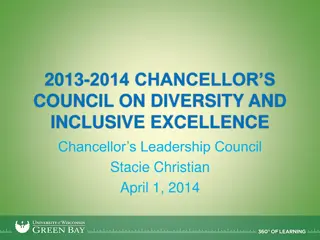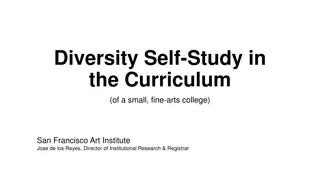Promoting Inclusivity and Diversity in Student Community
Learn about the student population for the academic year 2016/17, including demographics and distribution among different institutes. Explore the roles of Inclusivity Reps in creating an inclusive and welcoming environment, addressing welfare issues, and promoting diversity. Understand the concepts of inclusivity, inclusion, and equality, and how they contribute to a more vibrant and welcoming student community.
Download Presentation

Please find below an Image/Link to download the presentation.
The content on the website is provided AS IS for your information and personal use only. It may not be sold, licensed, or shared on other websites without obtaining consent from the author. Download presentation by click this link. If you encounter any issues during the download, it is possible that the publisher has removed the file from their server.
E N D
Presentation Transcript
Welcome Inclusivity Reps Kate Gynn Academic & Welfare Advisor
Who are our students? (2016/17) What was our student population? 10,747 The percentage of student body who are female: 66.9% The percentage of students who have disabilities: 12.2% Percentage of student body who are mature (over 21): 59.7% Percentage of student Body who are mature (over 25): 38.1%
Who are our students? The biggest Institute? Health & Society (34%) The smallest Institute? Science & the Environment (6%) Where is Sport & Exercise Science? Institute of Health and Society: 34% Institute of Education: 23% Worcester Business School: 13% Institute of Sport and Exercise Science: 12% Institute of Humanities and Creative Arts: 11% Institute of Science and the Environment: 6%
Inclusivity Reps Working to promote an inclusive and friendly environment for all members Be warm and welcoming Give advice Solve welfare issues Fix personal problems
Inclusivity Reps A direct contact for students who might find it difficult to sign up and get stuck in To be a point of contact for any member of a Club or Society
What does Inclusivity mean? Which different groups of people might feel less included? What circumstances might make people feel less included? Is your club/society open to all? Does it reflect and encourage membership from the student community in which we are based?
Inclusion Inclusion is the act of making all people within a society feel valued and included. Inclusion is the process of removing barriers to participation so that everyone can benefit from the opportunities on offer. Inclusion is about the culture of your club and is b An inclusive culture welcomes diversity and actively seeks to attract new people
Equality Equality is about making sure we treat people fairly and that everyone has equal opportunity to participate and fulfil their potential. It is not about treating everyone the same. Equality means that we recognise that people are different and that those differences require us to meet their needs differently. If we don t consider differences then we may be creating an environment that makes it difficult for some people to join in, participate or achieve their potential.
Diversity Diversity means recognising, valuing and respecting someone s background, knowledge, skills and experiences. It means placing a positive value on differences and individual life experiences. Inclusive environments encourage diversity and vice versa.
What are the Benefits of Being More Inclusive? New members bring new skills and experiences Improved image and profile A larger membership means more students to help run and organise Creates a positive environment where we can learn from each other Additional funding opportunities
Bobby has childcare commitments on Tuesday night. This is the night you always meet. How can you include Bobby in your club?
Where to Signpost? SU Part Time Officers represent marginalised groups Women s Officer LGBT+ Officer Student Disability Officer Ethnic Minority Students Officer International Students Officer Mature Students Officer
Firstpoint Monday to Friday 8.30am - 5.30pm 01905 542551 or firstpoint@worc.ac.uk Counselling and Mental Health ID cards Careers Disability and dyslexia Money advice Hardship fund (ALF) Program Advisers Study Abroad Academic support
Student Support Advisers Sometimes life can be complicated and when students feel overwhelmed, are finding relationships difficult, facing tough decisions or just want some reassurance they can book a confidential, 1-2-1 appointment with an Adviser through firstpoint. studentlife@worc.ac.uk
Fancy a Cuppa? Offering students a free drink, biscuit and a chat. Student Wellbeing Champions & Student Services Staff will be available for informal conversations with students Term-time Tuesday & Thursday 1pm - 2pm, in the alcove in firstpoint. Extra over first few weeks of term
Counselling & Mental Health Service www.worc.ac.uk/counselling Students can request support by completing an online Self-Referral Form. Telephone 01905 54 2832, or email cmh@worc.ac.uk. Anger Depression Relationships Anxiety Bereavement
SU Help & Advice Kate Gynn, Academic & Welfare Advisor Independent and confidential help & advice Academic issues like mitigating circumstances & plagiarism Complaints about the University Disciplinary procedures Accommodation issues (private and University) Welfare advice
What are you going to do to make your club more inclusive?
Next Steps Introduce yourself to members in person or via social media and tell them about your role Actively try and ensure your club/society is trying to make changes to become more inclusive Keep your useful resources as a reference Keep in touch with the SU if you have any issues
Support for Inclusivity Reps First point of call for inclusivity issues: Academic & Welfare Adviser - Independent and confidential help & advice Kate Gynn k.gynn@worc.ac.uk












